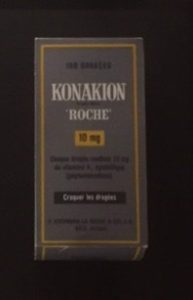Swiss precision
 This week I am on my way to the International Society of Thrombosis and Haemostatsis meeting in Berlin. This is a great opportunity to catch up with all the latest developments and research in the field of blood clotting. As a stopover, Angela and I spent a couple of days in Zurich in Switzerland; what a beautiful city. I thought there must be some link between Switzerland and clotting. Switzerland is famous for chocolate, watches and yodelling and none of these are connected to blood clots. Then I realised that Roche is based in Switzerland in the City of Basel. Many of you will be familiar with the CoaguChek used for warfarin monitoring, which is made by Roche Diagnostics, but I found it hard to think of a medication made by Roche linked to clotting.
This week I am on my way to the International Society of Thrombosis and Haemostatsis meeting in Berlin. This is a great opportunity to catch up with all the latest developments and research in the field of blood clotting. As a stopover, Angela and I spent a couple of days in Zurich in Switzerland; what a beautiful city. I thought there must be some link between Switzerland and clotting. Switzerland is famous for chocolate, watches and yodelling and none of these are connected to blood clots. Then I realised that Roche is based in Switzerland in the City of Basel. Many of you will be familiar with the CoaguChek used for warfarin monitoring, which is made by Roche Diagnostics, but I found it hard to think of a medication made by Roche linked to clotting.
Vitamin K
 It was only when I visited the museum in Zurich and saw a display of medications produced in Switzerland that I realised that vitamin K was made by Roche. The photo is from the collection in the National museum: vitamin K (Konakion).
It was only when I visited the museum in Zurich and saw a display of medications produced in Switzerland that I realised that vitamin K was made by Roche. The photo is from the collection in the National museum: vitamin K (Konakion).
Vitamin K is essential for normal clotting and is required for the synthesis of several clotting factors. Warfarin works by blocking the action of vitamin K and stops the production of these clotting factors. Occasionally the blood can get too thin when you take warfarin and cause bleeding, Vitamin K can help to stop bleeding by rapidly reversing the action of warfarin.
The discovery of vitamin K in the 1930s was an important step in the understanding of blood clotting. Henrik Dam and Edward Doisy were awarded the Nobel prize for physiology in 1943 for the discovery of vitamin K.

Have you read the recent study on the thin blood of some Swiss Amish in Indiana? It confers longevity and is a LOF of Serpine1 gene. 2 copies can be a problem. This variant was introduced by someone of Swiss ancestry. So my guess is it is in more of the population.